United States profile - Timeline
- Published
A chronology of key events:
1565 - First permanent European settlement in North America - St Augustine, present-day Florida - founded by the Spanish. North America is already inhabited by several distinct groups of people, who go into decline following the arrival of settlers.
1607 - Jamestown, Virginia, founded by English settlers, who begin growing tobacco.
1620 - Plymouth Colony, near Cape Cod, is founded by the Pilgrim Fathers, whose example is followed by other English Puritans in New England.
17th-18th centuries - Hundreds of thousands of Africans brought over and sold into slavery to work on cotton and tobacco plantations.
1763 - Britain gains control of territory up to the Mississippi river following victory over France in Seven Years' War.
War of Independence
1774 - Colonists form First Continental Congress as Britain closes down Boston harbour and deploys troops in Massachusetts.
1775 - American Revolution: George Washington leads Continental Army to fight against British rule.
1776 4 July - Declaration of Independence endorsed by Congress; colonies declare independence.
1781 - Rebel states form loose confederation after defeating the British at the Battle of Yorktown.
1783 - Britain accepts loss of colonies by virtue of Treaty of Paris.
1787 - Founding Fathers draw up new constitution for United States of America. Constitution comes into effect in 1788.
1789 - George Washington elected first president of USA.
1791 - Bill of Rights guarantees individual freedom.
1803 - France sells Louisiana territories to USA.
1808 - Atlantic slave trade abolished.
1812-15 - War of 1812 between the US and Britain, partly over the effects of British restrictions on US trade during the Napoleonic Wars.
19th century - Residual resistance by indigenous people crushed as immigration from Europe assumes mass proportions, with settlers moving westwards and claiming "manifest destiny" to control North America; number of states in the union rises from 17 to 45.
1846-48 - US acquires vast tracts of Mexican territory in wake of Mexican War including California and New Mexico.
Civil War
1854 - Opponents of slavery, or abolitionists, set up Republican Party.
1860 - Republican candidate Abraham Lincoln elected president.
1860-61 - Eleven pro-slavery southern states secede from Union and form Confederate States of America, triggering civil war with abolitionist northern states.
1863 - Lincoln issues Emancipation Proclamation, declaring slaves in Confederate states to be free.
1865 - Confederates defeated; slavery abolished under Thirteenth Amendment. Lincoln is assassinated.
1898 - US gains Puerto Rico, Guam, the Philippines and Cuba following the Spanish-American war. US annexes Hawaii.
World War I and the Great Depression
1917-18 - US intervenes in World War I, but rejects membership of League of Nations in its aftermath.
1920 - Women given the right to vote under the Nineteenth Amendment.
1920 - Sale and manufacture of alcoholic liquor outlawed. The Prohibition era sees a mushrooming of illegal drinking joints, home-produced alcohol and gangsterism.
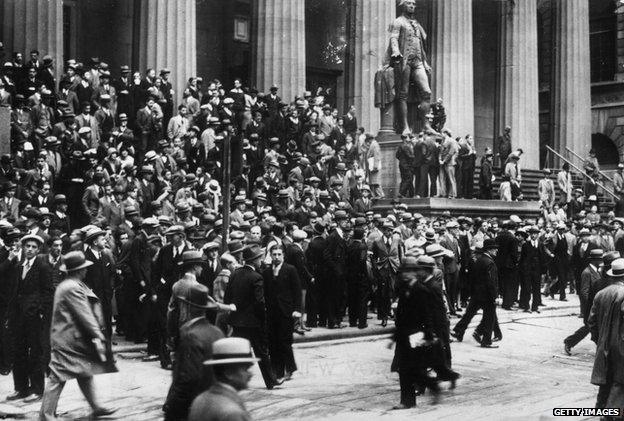
The Wall Street crash of 1929 sparked the Great Depression
1924 - Congress gives indigenous people right to citizenship.
1929-33 - More than 13 million people are unemployed after the Wall Street stock market crash of 1929 triggers the Great Depression. President Herbert Hoover rejects direct federal relief.
1933 - President Franklin D Roosevelt launches "New Deal" recovery programme which includes major public works. Sale of alcohol resumes.
World War II and the Cold War
1941 - Japanese warplanes attack US fleet at Pearl Harbour in Hawaii, leading to US joining World War II against the Axis powers.
1945 - US drops two atomic bombs on Hiroshima and Nagasaki. Japan surrenders.
1947 - US enunciates policy of aid for nations it deems threatened by communism in what became known as the Truman Doctrine. Cold War with Soviet Union begins.
1948 - America's programme to revive ailing post-war European economies - the Marshall Plan - comes into force. Some $13bn is disbursed over four years and the plan is regarded as a success.
1950-54 - Senator Joseph McCarthy carries out a crusade against alleged communists in government and public life; the campaign and its methods become known as McCarthyism. In 1954 McCarthy is formally censured by the Senate.
1950-53 - US forces play leading role against North Korean and Chinese troops in Korean War.
Desegregation and the Vietnam war
1954 - Racial segregation in schools becomes unconstitutional; start of campaign of civil disobedience to secure civil rights for Americans of African descent.
1960 - Democratic Party candidate John F Kennedy elected president, narrowly defeating his rival Richard Nixon.
1961 - Bay of Pigs invasion: an unsuccessful attempt to invade Cuba by Cuban exiles, organised and financed by Washington.
1962 - US compels Soviet Union to withdraw nuclear weapons from Cuba in what has become known as the Cuban missile crisis.
1963 - President John F Kennedy assassinated; Lyndon Johnson becomes president.
1964 - US steps up its military intervention in Vietnam. Civil Rights Act signed into law; it aims to halt discrimination on grounds of race, colour, religion, nationality.
1968 - Black civil rights leader Martin Luther King assassinated.
1969 - Republican Party candidate Richard Nixon elected president amid growing public opposition to Vietnam war. US military presence in Vietnam exceeds 500,000 personnel.
US astronaut Neil Armstrong becomes the first person to walk on the Moon.
1972 - Nixon re-elected and makes historic visit to China that leads to recognition of the communist government .
1973 - Vietnam ceasefire agreement signed. The campaign had claimed some 58,000 American lives.
1974 - President Nixon resigns in the Watergate scandal over a 1972 break-in at the Democratic Party headquarters.
1976 - Democratic Party candidate Jimmy Carter elected president.
1979 - US embassy in Tehran, Iran, seized by radical students. The 444-day hostage crisis - including a failed rescue attempt in 1980 - impacts on President Carter's popularity and dominates the 1980 presidential election campaign.
Global assertiveness
1980 November - Republican Party's Ronald Reagan elected president, and goes on to adopt a tough anti-communist policy abroad and tax-cutting policies at home.
1986 January - Space shuttle Challenger explodes shortly after take off from Cape Canaveral. All seven crew members are killed. Manned space flights are suspended until September 1988.
1986 - US warplanes bomb Libyan cities. "Irangate" scandal uncovered, revealing that proceeds from secret US arms sales to Iran were used illegally to fund Contra rebels in Nicaragua.
1988 - Reagan's vice-president, George Bush, elected president.
1989 - US troops invade Panama, oust its government and arrest its leader, one-time Central Intelligence Agency informant General Manuel Noriega, on drug-trafficking charges.
1991 - US forces play dominant role in war against Iraq, which was triggered by Iraq's invasion of Kuwait and ended with the expulsion of Iraqi troops from that country.
The Clinton years
1992 - Democratic Party candidate Bill Clinton elected president.
1992 - Congress passes North American Free Trade Agreement, or Nafta, intended to create free-trade bloc among US, Canada and Mexico.
1995 - Oklahoma bomb by far-right activists kills more than 160 people in worst ever incident of its kind in US.
1998 - Scandal over Clinton's sexual impropriety with White House worker Monica Lewinsky dominates domestic political agenda, and leads to impeachment proceedings in Congress.
1999 March-June - US plays leading role in Nato bombardment of Yugoslavia in response to Serb violence against ethnic Albanians in the province of Kosovo.
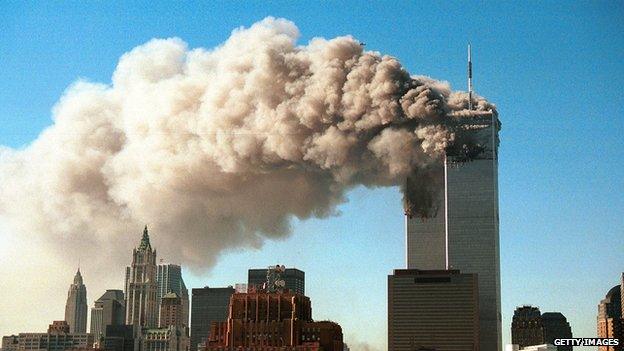
The 9/11 twin attacks in New York shattered Americans' sense of invulnerability
2000 November - Republican Party's George W Bush wins presidency.
11 September attacks
2001 11 September - Co-ordinated suicide attacks by al-Qaeda terror group prompts the US to embark on a ''war on terror'' that includes invasions of Afghanistan and Iraq.
2001 October - US leads massive campaign of air strikes against Afghanistan and helps opposition forces defeat the Taliban regime.
2002 November - President Bush signs into law a bill creating a Department of Homeland Security, the biggest reorganisation of federal government in more than 50 years.
2003 February - Space shuttle Columbia's 28th mission ends in tragedy when the craft breaks-up while re-entering the atmosphere. The seven astronauts on board are killed.
Iraq war
2003 March - Missile attacks on Baghdad mark the start of a US-led campaign to topple the Iraqi leader Saddam Hussein. US forces advance into central Baghdad in early April.
2004 May - Furore over pictures showing the abuse of Iraqi prisoners in US custody.
2005 August - Hundreds of people are killed when Hurricane Katrina, the most destructive storm to hit the US in decades, sweeps through gulf coast states. Much of the city of New Orleans is submerged by flood waters.
2006 March - Congress renews the USA Patriot Act, a centrepiece of the government's fight against terrorism, after months of debate about its impact on civil liberties. The government agrees to some curbs on information gathering.
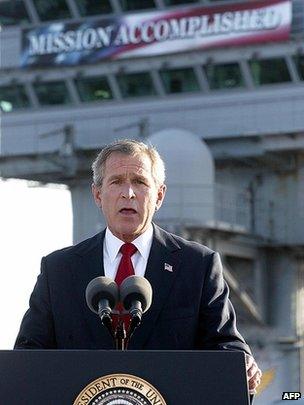
Bush years: Wave of support after 9/11 yielded to derision at home and abroad
2007 January - President Bush announces a new Iraq strategy; thousands more US troops will be dispatched to shore up security in Baghdad.
2008 September - Turmoil in the US and international financial markets as major Wall Street investment bank Lehman Brothers collapses and other big US financial players face growing troubles as a result of the "credit crunch".
Obama elected
2008 November - Democratic Senator Barack Obama becomes the first black president of the United States.
2009 January - First "Tea Party" rally held in protest at Obama administration's plans to bail out banks and introduce healthcare reform. The populist and libertarian movement acts as focus for conservative opposition to the president's reform plans.
2010 March - Democrats in Congress succeed in passing a bill on health care reform, despite strong Republican opposition.
US and Russia announce agreement on a new nuclear arms reduction treaty to replace the 1991 Strategic Arms Reduction Treaty. The pact was to be signed on 8 April.
President Obama unveils a new defence policy significantly curtailing the circumstances in which the US would use nuclear weapons.
2011 May - US forces kill Al-Qaeda leader Osama Bin Laden in an operation in the Pakistani city of Abbottabad.
2011 July - The final Space Shuttle mission is completed with the landing of Atlantis on 21 July, bringing about the end of the 30-year programme.
2012 September - The US ambassador in Libya is killed when armed men storm the consulate in Benghazi.
2013 April - Twin bomb blasts targeting the Boston marathon kill three people and injure more than 170. Soviet-born Islamic extremist Dzhokhar Tsarnaev is charged after a manhunt in which his elder brother and suspected co-conspirator Tamerlan is killed.
2013 May - Former National Security Agency (NSA) contractor Edward Snowden flees to Russia via Hong Kong after revealing leaking information on extensive internet and telephone surveillance by US intelligence.
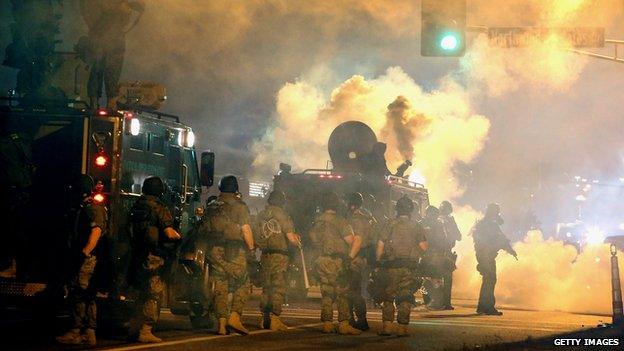
The Ferguson unrest of 2014 again brought interlinked issues of race and law enforcement to the fore
2014 August-November - The shooting of an unarmed black teenager by a white policeman sparks a weeks of riots the Missouri town of Ferguson. In November, a grand jury's decision not to charge the officer with murder sets off new unrest.
Republican resurgence
2014 November - Republicans win a Senate majority in mid-term elections, gaining control of both houses of Congress and further reducing President Obama's room for manoeuvre.
2014 December - US and Cuba begin steps to normalise diplomatic relations after more than 50 years of stand-off.
2015 March - President Obama announces that 10,000 US troops will remain in Afghanistan as advisors and trainers until 2016.
2015 June - US accuses Chinese hackers of massive breach of personal data of nearly four million government workers. China denies any role.
White supremacist shoots dead nine African-American worshippers in a church in Charleston, prompting nationwide revulsion and demands for end to public display of Confederate Civil-War-era symbols.
2015 December - FBI say Muslim couple who shot dead 14 people and wounded 21 others at office party in San Bernadino, California, were Islamist extremists who had prepared the attack, the worst on US soil since September 2001, in advance.
Trump elected president
2016 November - Republican candidate Donald Trump wins presidential election, defeating Democratic candidate Hillary Clinton in one of the biggest political upsets in US history. He is inaugurated in January.
2017 January - President Trump signs executive orders restricting visas for people seeking to enter the US from certain Muslim-majority countries, and barring funding for cities that shelter illegal immigrants. Both policies are blocked by the courts.
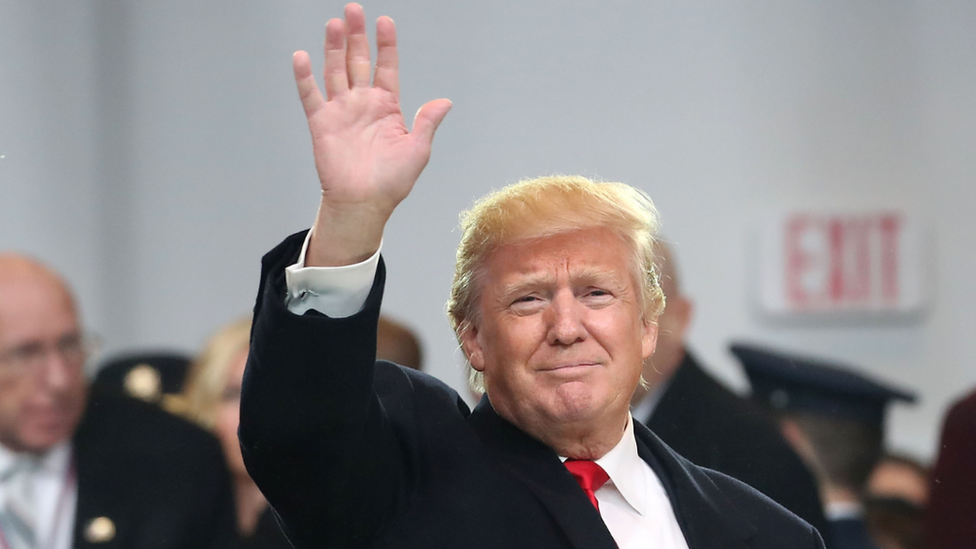
Donald Trump won a surprise victory in the 2016 presidential election
2017 May - President Trump sacks FBI Director James Comey, prompting a public row about whether the White House was trying to derail an inquiry into alleged collusion between Russian efforts to influence the 2016 election and the Trump campaign.
2017 August - A woman is run over and killed by a suspected far-right sympathiser amid protests in Charlottesville, Virginia. President Trump is widely criticised for blaming both sides for violence, rather than the neo-Nazis and White supremacists.
2017 December - US recognises Jerusalem as capital of Israel and announces plans to move embassy there, prompting anger in Arab countries. In March 2019 the US recognises Israeli sovereignty over the Golan Heights.
North Korea diplomacy
2018 April - China imposes 25% tariffs on a range of US goods in response to similar US measures.
2018 June - After months of hostile rhetoric, President Trump and North Korean leader Kim Jong-un meet in Singapore and agree to continue dialogue aimed at reducing tensions on the Korean peninsula.
2018 October - The US, Canada and Mexico reach a new trade deal to replace the current North American Free Trade Agreement (Nafta).
The US announces plans to withdraw from the 1987 Intermediate-Range Nuclear Forces (INF) treaty, which restricts US and Russian short- and medium-range nuclear missiles, accusing Moscow of having violated its terms.
Road to impeachment
2018 November - Opposition Democrats take control of House of Representatives in mid-term elections, making it harder for President Trump's Republicans to pass legislation.
2019 February - US and North Korea talks in Vietnam break down over pace of nuclear disarmament.
2019 March - Mueller Report finds no evidence of collusion between Russian efforts to influence the 2016 election and the Trump campaign.
2019 October - US withdraws troops from northern Syria, which prompts Turkey to occupy Kurdish-run parts of the north in an attempt to create a buffer zone.
2019 December - President Trump is impeached by the House of Representatives on charges of abuse of power and obstruction of Congress. His trial is set to begin in the Senate the following month.
2020 January - US drone strike kills leading Iranian commander Qasem Soleimani at Baghdad Airport, promoting Iranian threats of retaliation.
2020 March - National emergency declared over the Covid-19 pandemic.
2020 May - Nationwide protests break out following the killing of African-American George Floyd by Minneapolis police.
2020 November - Democrat former Vice-President Joe Biden defeats Donald Trump in the presidential election.
2021 January - Joe Biden inaugurated president amid unprecedented security, a week after Trump supporters stormed the Capitol in Washington DC.